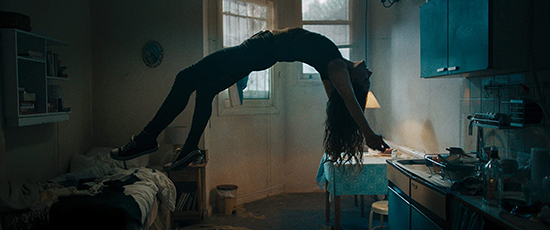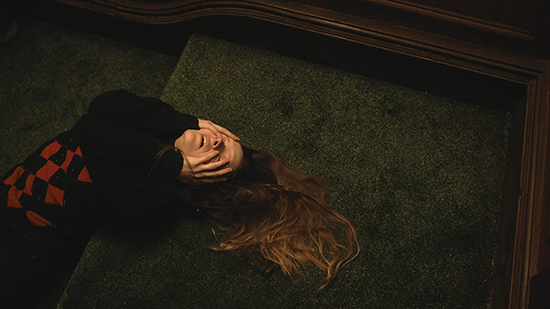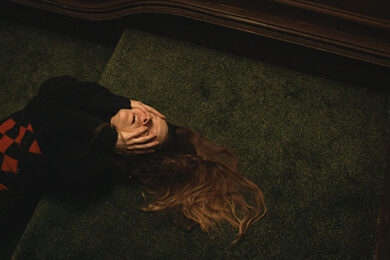I only have a brief slice of time with director Rose Glass. We’re alone, but our interview is sandwiched in a weekend of continuous events and appearances. When congratulated on her recent successes, humility is an instant reflex and her first instinct is to commend other people. We get on to her winning film, and she seems reluctant to assume its success, despite already being awarded several accolades. She assures me, “I think over half the audience in the premiere will be my family and friends, so I expect them to be very loud and supportive.”
Glass’ debut feature, Saint Maud, is poised to become the next independent horror sensation for distributor A24. The film premiered at the Toronto International Film Festival as part of the Midnight Madness section. Following additional screenings at Fantastic Fest in Texas, the film, and its director, was named the winner of IWC Schauffhausen’s £50,000 Filmmaker Bursary, in association with the BFI.
Throughout our conversation, there remains an air that this isn’t quite real for Glass. While fellow directors Peter Mackie Burns and Hong Khaou were recognised by the Bursary Award for their second features, Glass is a fresh voice on the UK’s independent cinema scene. “The nominees are selected off the back of their first or second feature, so a potentially precarious point in their career,” she clarifies. “For whatever reason, they decided to give it to me.” This reason became clear for festival attendees who were lucky enough to experience the film’s bewitching atmosphere before its wide release later this year.
The generous grant represents a gift of freedom for filmmakers. One of the most coveted prizes in the UK’s arts sphere, the award gives emerging directors time, firstly to recover from the pressures of finding homes for their first or second features, and to subsequently work on their next projects. The award was presented by Danny Boyle at an event that sounds like Glass’s closest proximity to stardom, and with any luck a glitzy preview of many more career moments to come for the emerging filmmaker.
Of course, the film proved a runaway success at the London Film Festival thanks to the buzz of the bursary and its reception at Midnight Madness. Two screenings for the film had already sold out by the date of our conversation. I comment this must be encouraging, and Glass manages to remain characteristically humble when she replies, “Yes, I know! I think it’s just my mum booking everything, though.”
Midnight Madness has a reputation for propelling some of the most prevalent cult films of recent years, almost exclusively previewing gnarly, inventive horrors, thrillers and oddities. The more repellent the better. Charged audiences, some or many under the influence of a few drinks, are riled up by the potential of seeing a breed of genre film that doesn’t tend to play widely in major multiplexes these days.
Following her description of the rowdier atmosphere of the Toronto event, I ask Glass if being a few drinks into a night would be the best frame of mind to see the film. Evidently, this had already proven true: “I think so. It’s not a jump scare-a-minute film but there are those moments in it, and it’s a lot more fun to experience with an audience. There’s a lot of weird dark humour in it as well. Seeing it and hearing it with an audience that are very vocal, particularly for a nervous filmmaker in the audience, is very reassuring.”
Rose Glass is flustered, but confident. Her fugue is tinged with sharp readiness, a snippet of insight into the hectic promotional life, but ready to take on the next challenge. Much like Bong Joon-ho’s romp across the US after the unprecedented success of Parasite, promoting films and, by extension, yourself as a creative, certainly takes its toll.
Saint Maud’s Midnight Madness premiere could threaten to colour its release with a certain reputation. Recent cult release Color Out of Space has its origins with the festival slot, and has been beguiling audiences with its fleshy, Cronenbergian adaptation of the H.P. Lovecraft story. However, Glass took a more ephemeral approach to how madness can encroach on perceptions of the self. “I wanted Saint Maud to be a film where the audience is put inside the character’s head as she’s going through a kind of psychotic episode,” the director explains. Our conversation brings up Paul Shrader’s First Reformed as perhaps a more appropriate comparison, Glass says. “If people believe in God, you can read it that way as well.”
As with Shrader’s faith-based environmental drama, Saint Maud employs Christianity as a launching pad for more insular conflicts. Up-and-comer Morfydd Clark stars as the eponymous Maud, a young nurse who turns to religion after a vaguely hinted trauma. Her growing convictions are tested by the arrival of Jennifer Ehle’s Amanda, a dancer whose career has been withered by a developing cancer.
“They have amazing on-screen chemistry,” says Glass. “You think with any of these characters while you’re writing it you’ve got this really clear, strong idea in your head, that you know them like the back of your hand. Then an amazing actor comes in and does something to it that’s always completely different and fresh.”
Ehle is considered somewhat an icon amongst Brits, having portrayed Elizabeth Bennett for arguably the most successful adaptation of Jane Austen’s Pride and Prejudice, the 1995 BBC miniseries.
“They were very supportive and generous with me as a first time filmmaker, particularly Jennifer,” Glass says. “I didn’t meet her until she was flown over for the shoot, so that was nerve-wracking as I had never cast someone like that before. But she quickly demystified a lot of these more uptight acting do’s and don’ts that I had in my head.”
Clark, meanwhile, featured in an Austen adaptation of her own back in 2016, playing Georgiana Darcy in Pride and Prejudice and Zombies. She has since become increasingly familiar, both in cinemas with her dual role in Armando Iannuci’s The Personal History of David Copperfield, as well as her prestige television appearances in His Dark Materials, BBC’s Dracula, and the upcoming Lord of the Rings series for Amazon.

Despite the immediately apparent pedigree of the two co-leads, Saint Maud remained a thrill to shoot as far as it is gripping to experience. “I had the best time working with Morfydd and Jennifer,” Glass admits. “It’s a very small cast within the film so a lot of the scenes are just Morfydd by herself or just the two of them so it was a nice intimate relaxed atmosphere on set.”
Compelled by the processes of mental deterioration and obsession, the framework of the horror seemed to flow naturally from Glass’s screenwriting. She confesses, “It just seemed to naturally fit with the story. I didn’t set out wanting to make a horror film, but it naturally came through.” While the film’s climax doesn’t attempt to match the breathless catharsis of Ari Aster’s Midsommar, Saint Maud’s tactful employ of mental health coding and strenuous obsession nevertheless offers a vicarious release from our own stifling psychological boundaries.
I ask why Glass was drawn to horror to explore themes that have been previously absent in similar works, to which she, quite rightly, responds, “It’s the job of anyone working in the arts or telling stories to explore topics and themes that challenge people a bit, then dress it up in an exciting genre story.” Certainly a presence in Saint Maud, Glass was still reluctant to allow these more scrutinous aspects to stray the film away from its horror intentions. She adds, “I don’t like the idea of making films that are preachy. I want things to be entertaining first and foremost, and exciting and original.”
She concludes by echoing the feelings of budding filmmakers everywhere. “Getting a film off the ground is such a lengthy, difficult process it feels like, why bother to go through all that unless it’s something you actually care about.”
Describing debut features as ‘confident’ frequently rings as patronising. A whole history of shorts and experimental films often goes ignored, as if first features manifest from the ether. Indeed, Glass has a storied filmmaking history, having directed the acclaimed short Room 55 during her time at the National Film and Television School. However, it feels dishonest to label Saint Maud as anything short of an electrifying accomplishment
After the film’s whirlwind early reception, with some critics circles preemptively naming it among the best films of the year, the upcoming director is already likely to build an impressive oeuvre in the first stages of her career. Glass knows she has to keep tight-lipped, but does let some things slip. “I’ve got some pretty weird ideas which I think could be really exciting. I’ve got a couple I’m working on, one of which I’m co-writing with Weronika. It’s a sort of fucked up romance.”
Following Saint Maud’s festival acclaim, the name Rose Glass is sure to cause a stir across future film circuits, when the likes of Cannes and TIFF are up and running again. Initially slated for an April release, there has yet been no word from A24 regarding a potential home on Video On Demand services. In the midst of self-isolation, Glass’s sweat-inducing debut might just make for ideal viewing in the comfort of our own homes, with the doors locked and all the lights switched off.




